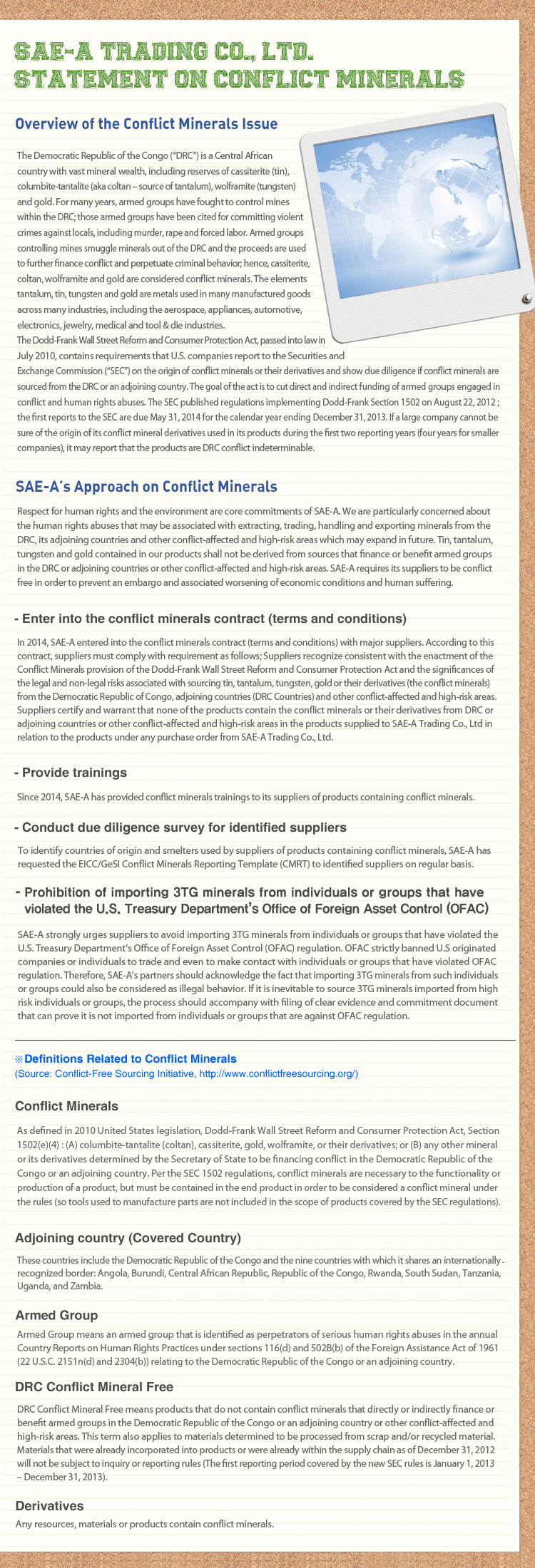SAE-A Trading Co., Ltd. STATEMENT ON CONFLICT MINERALS

Overview of the Conflict Minerals Issue
The Democratic Republic of the Congo (“DRC”) is a Central African country with vast mineral wealth, including reserves of cassiterite (tin), columbite-tantalite (aka coltan – source of tantalum), wolframite (tungsten) and gold. For many years, armed groups have fought to control mines within the DRC; those armed groups have been cited for committing violent crimes against locals, including murder, rape and forced labor. Armed groups controlling mines smuggle minerals out of the DRC and the proceeds are used to further finance conflict and perpetuate criminal behavior; hence, cassiterite, coltan, wolframite and gold are considered conflict minerals.The elements tantalum, tin, tungsten and gold are metals used in many manufactured goods across many industries, including the aerospace, appliances, automotive, electronics, jewelry, medical and tool & die industries. The Dodd-Frank Wall Street Reform and Consumer Protection Act, passed into law in July 2010, contains requirements that U.S. companies report to the Securities and Exchange Commission (“SEC”) on the origin of conflict minerals or their derivatives and show due diligence if conflict minerals are sourced from the DRC or an adjoining country. The goal of the act is to cut direct and indirect funding of armed groups engaged in conflict and human rights abuses.The SEC published regulations implementing Dodd-Frank Section 1502 on August 22, 2012; the first reports to the SEC are due May 31, 2014 for the calendar year ending December 31, 2013. If a large company cannot be sure of the origin of its conflict mineral derivatives used in its products during the first two reporting years (four years for smaller companies), it may report that the products are DRC conflict indeterminable.
SAE-A’s Approach on Conflict Minerals
Respect for human rights and the environment are core commitments of SAE-A. We are particularly concerned about the human rights abuses that may be associated with extracting, trading, handling and exporting minerals from the DRC and adjoining countries. Tin, tantalum, tungsten and gold contained in our products shall not be derived from sources that finance or benefit armed groups in the DRC or adjoining countries. SAE-A requires its suppliers to be DRC conflict free in order to prevent an embargo and associated worsening of economic conditions and human suffering.
- - Enter into the conflict minerals contract (terms and conditions) In 2014, SAE-A entered into the conflict minerals contract (terms and conditions) with major suppliers. According to this contract, suppliers must comply with requirement as follows; Suppliers recognize consistent with the enactment of the Conflict Minerals provision of the Dodd-Frank Wall Street Reform and Consumer Protection Act and the significances of the legal and non-legal risks associated with sourcing tin, tantalum, tungsten, gold or their derivatives (the conflict minerals) from the Democratic Republic of Congo and adjoining countries (DRC Countries). Suppliers certify and warrant that none of the products contain the conflict minerals or their derivatives from DRC countries or adjoining countries in the products supplied to SAE-A Trading Co., Ltd in relation to the products under any purchase order from SAE-A Trading Co., Ltd.
- - Provide trainings Since 2014, SAE-A has provided conflict minerals trainings to its suppliers of products containing conflict minerals.
- - Conduct due diligence survey for identified suppliers To identify countries of origin and smeltersused by suppliers of products containing conflict minerals, SAE-A has requested the EICC/GeSI Conflict Minerals Reporting Template (CMRT) to identified suppliers on regular basis.
※Definitions Related to Conflict Minerals (Source: Conflict-Free Sourcing Initiative, http://www.conflictfreesourcing.org/)
Conflict Mine rals
As defined in 2010 United States legislation, Dodd-Frank Wall Street Reform and Consumer Protection Act, Section 1502(e)(4): (A) columbite-tantalite (coltan), cassiterite, gold, wolframite, or their derivatives; or (B) any other mineral or its derivatives determined by the Secretary of State to be financing conflict in the Democratic Republic of the Congo or an adjoining country. Per the SEC 1502 regulations, conflict minerals are necessary to the functionality or production of a product, but must be contained in the end product in order to be considered a conflict mineral under the rules (so tools used to manufacture parts are not included in the scope of products covered by the SEC regulations).
Adjoining country (Covered Country)
These countries include the Democratic Republic of the Congo and the nine countries with which it shares an internationally recognized border: Angola, Burundi, Central African Republic, Republic of the Congo, Rwanda, South Sudan, Tanzania, Uganda, and Zambia.
Armed Group
Armed Group means an armed group that is identified as perpetrators of serious human rights abuses in the annual Country Reports on Human Rights Practices under sections 116(d) and 502B(b) of the Foreign Assistance Act of 1961 (22 U.S.C. 2151n(d) and 2304(b)) relating to the Democratic Republic of the Congo or an adjoining country.
DRC Conflict Mineral Free
DRC Conflict Mineral Free means products that do not contain conflict minerals that directly or indirectly finance or benefit armed groups in the Democratic Republic of the Congo or an adjoining country. This term also applies to materials determined to be processed from scrap and/or recycled material. Materials that were already incorporated into products or were already within the supply chain as of December 31, 2012 will not be subject to inquiry or reporting rules (The first reporting period covered by the new SEC rules is January 1, 2013 – December 31, 2013).
Derivatives
Any resources, materials or products contain conflict minerals
